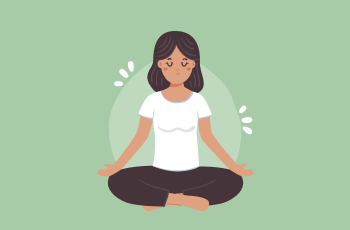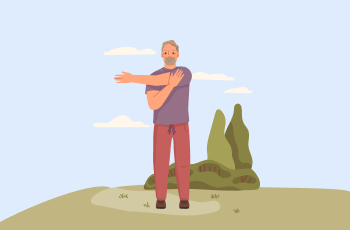30 Healthy Habits for Men over 40
Written by Sai Pragna Chagarla, Writer at Hola Health
Medically Reviewed by Dr Nelson Lau, MBBS FRACGP, GP & Digital Health Specialist
As men approach the age of 40, adopting healthy habits becomes increasingly crucial for maintaining their well-being. They might start facing health challenges like heart disease, high blood pressure, depression, and Type 2 Diabetes. However, many men may overlook their health needs due to the demands of juggling multiple responsibilities at this age. The notion of masculinity and embarrassment in discussing sensitive issues such as mental health and sexually transmitted infections (STIs) often lead me to downplay their health concerns and potentially cause further harm.
However, 40 and beyond is a crucial time to pay attention to our bodies and make positive changes to ensure a long and healthy life. According to the Australian Bureau of Statistics, there are around 12.5 million males living in Australia with the median age being 37 years old. This shows that more than half of the Australian male population is above 40 or nearing 40.
Common Health Concerns for Men Over 40
The National Men’s Health Strategy by the Australian Government states that in general Australian males is healthy when compared to most countries. But when compared to their female counterparts there is still a lot of room for improvement in Men’s Health. Here are some of the major health concerns for men over 40 according to Australian Institute of Health and Welfare:
- The leading causes of ill health or death in men as they age are cancer, cardiovascular diseases, mental health conditions, substance abuse, musculoskeletal conditions, and injuries.
- 53% of Australian men aged 45 and above have at least one chronic condition. The top 10 chronic conditions that Australian men are suffering from are arthritis, asthma, back problems, cancer, COPD, diabetes, cardiovascular disease, kidney disease, osteoporosis, and mental health.
- The risk of developing cancer increases significantly as men age, with prostate cancer and melanoma being the most common types among males aged over 40.
- According to the National Study of Mental Health and Wellbeing (NSMHW) (ABS 2022h) 43% of men aged 18 and above have reported having a mental disorder at some point in their life.
- Around 149,600 Australian men aged 30 and above are living with dementia as of 2022.
- Sexually Transmissible infections (STIs) such as gonorrhoea, syphilis, chlamydia, human immunodeficiency virus (HIV), donovanosis, hepatitis B and hepatitis C are also significant health concerns.
- The top 3 major causes of concern for men between 45 and 64 are coronary heart disease, lung cancer and suicide.
- The National Drug Strategy Household Survey states that one in four Australian men (24%) are lifetime risky drinkers.
- 3 out of 4 men are either overweight or obese.
30 Healthy Lifestyle Tips for men over 40
It is important to be proactive when it comes to protecting health. This approach will be the foundation for a vibrant and fulfilling future. Here are some healthy habits that men should incorporate to age well.
Diet & Nutrition
Fast-paced life, the burden of financial and family issues are making us pick poor eating habits. This is not only dangerous for our bodies but also for our minds. Some of the major health risk factors for dementia are overweight (including obesity) and physical inactivity. Here are some tips to improve your nutrition and health:
- Balanced Diet: Focus on consuming a balanced diet rich in fruits, vegetables, lean proteins, whole grains, and healthy fats. Ensure you consume the recommended amounts of all five food groups based on your age and body size.
- Get Vocal for Local: Embrace Australian staples such as seafood, avocado, and native fruits like mangoes and kiwifruits. Get familiar with the traditional bush tucker.
- Understand nutrients: Follow the Australian Dietary Guidelines and focus on getting the right amount of nutrients and micronutrients for your body. Use apps such as EatForHealth Nutrient Calculators and Health Star rating system to understand the food you eat better.
- Portion Control: Pay attention to portion sizes to avoid overeating, which can lead to weight gain and associated health issues.
- Limit Processed Foods: Minimise intake of processed foods, sugary snacks, and fast food.
- Healthy Fats: Incorporate sources of healthy fats into your diet, such as nuts, seeds, olive oil, and fatty fish like salmon and mackerel. These fats are beneficial for heart health and brain function.
- Bone Health: Ensure an adequate intake of calcium and vitamin D to support bone health and reduce the risk of osteoporosis. Incorporate dairy products, leafy greens, fortified foods, and supplements if necessary.
- Stay hydrated by drinking plenty of water throughout the day, particularly in Australia’s hot and dry climate. Carry a reusable water bottle with you and aim to consume at least 8-10 glasses of water daily. Hydration is essential for maintaining bodily functions and overall health.
- Limit alcohol consumption to the recommended amount as too much alcohol can lead to heart issues and pancreatitis. Curb smoking is the primary cause of cancer.
- Maintain a Healthy Weight: Adopt a balanced diet and engage in regular physical activity to maintain a healthy weight and reduce the risk of obesity-related conditions such as heart disease, diabetes, and certain cancers.
Physical and Mental Wellness:
According to the Australian Institute of Health and Welfare (AIHW), only 43% of Australian men meet the recommended physical activity guidelines. 3 out of 4 suicidal deaths in Australia are by men, as per the ten to men study by Australian institute of Family Studies. It is important to be physically active and mentally well to have a happier older age for men. Here are some tips to follow:
- Be Physically Active: Regular exercise is not just about physical appearance; it significantly reduces the risk of chronic diseases such as cardiovascular disease, type 2 diabetes, and certain cancers. Engage in at least 150 minutes of moderate-intensity aerobic exercise or 75 minutes of vigorous-intensity exercise per week, combined with muscle-strengthening activities.
- Incorporate exercise into your lifestyle: Walk from school or work, climb those stairs, do some jumping jacks or yoga while watching your favourite show on Netflix. Go to the great outdoors and enjoy a range of activities. Dance away to your favourite tunes. Incorporate exercise into your daily activities.
- Avoid prolonged sitting: This will reduce the risk of cardiovascular disease. Take regular breaks to stand, stretch, and move around, especially if you have a sedentary job.
- Manage Stress: Stress would be a major problem with men over the age of 40 while juggling their careers and family. Practice mindfulness, meditation, or relaxation exercises to reduce stress levels and improve overall well-being.
- Get rid of loneliness: Most adult Australian men have reported being lonely in the ten-to-men study. This is a major cause of depression, and anxiety and could develop into a larger mental health issue. Prioritise social connections, and take some time out for friends, family, and colleagues. Do what you love the most. Join a hobby club or volunteer.
- Be Informed: Australian government initiatives such as the Men’s sheds, Healthy male, Australian Men’s health Forum are safe places to make friends, participate in activities and get physical and mental health information.
- Mindfulness and Relaxation: Incorporate mindfulness practices and relaxation techniques into your daily routine to promote mental clarity, resilience, and emotional well-being. Participate in yoga, meditation, and community workshops.
- Sleep Well: Aim for 7-9 hours of quality sleep each night to support physical and mental health. Create a conducive sleep environment by minimising noise, light, and electronic devices in the bedroom.
- Sun Protection: Australia’s sun exposure is intense. It is important to apply a broad-spectrum sunscreen with a high SPF rating before heading outdoors. Wear protective clothing, hats, and sunglasses to shield your skin from harmful UV rays. Seek shade during peak sun hours, especially in the scorching Australian summers.
Preventive Health Care:
Men tend to ignore their health after they reach the age of 40. They are either busy building their careers or managing their family. Most men do not seek care when the condition is at a mild stage leading to more severe health issues. Here are some preventive healthcare tips you should follow:
- Regular Health Check-ups: Schedule routine check-ups with your healthcare provider for preventive screenings and assessments. A range of health checks and assessments are available and are recommended by the Australian Government including:
- Medicare Benefits Schedule Health Checks for Men aged above 45 to check for chronic conditions.
- Bowel cancer checks are available every 2 years from the age of 50.
- General cancer screening for early detection of the disease
- Heart Monitoring: Heart health screening tests once every 2 years from the age of 45. For Aboriginal and Torres Strait islanders, this is above the age of 35.
- Blood Pressure Monitoring: Hypertension affects approximately 34% of Australian men aged 45–54 and increases the risk of heart disease and stroke, underscoring the importance of blood pressure monitoring. Monitor blood pressure regularly to detect and manage hypertension, a leading risk factor for cardiovascular disease.
- Cholesterol Testing: Get regular cholesterol tests to assess lipid levels and identify individuals at risk of cardiovascular disease.
- Diabetes Screening: Undergo screening for diabetes, especially if you have risk factors such as obesity, family history, or a sedentary lifestyle. This should happen every one to three years.
- Bowel Cancer Screening: Participate in Bowel cancer screening programs every 2 years above the age of 50 for early detection of the disease.
- Skin Cancer Checks: Schedule regular skin cancer checks with a dermatologist or general practitioner, especially if you have a history of sun exposure or a family history of skin cancer.
- Prostate Cancer Screening: Discuss prostate cancer screening options with your healthcare provider, including prostate-specific antigen (PSA) tests and digital rectal examinations (DRE), based on individual risk factors and preferences.
- Immunisations: Stay up to date with recommended vaccinations, including influenza, pneumococcal, and shingles vaccines, to prevent infectious diseases and their complications.
- Obstructive Sleep Apnoea (OSA): If you snore loudly or stop breathing for a few seconds during your sleep and feel tired during the day, you may be suffering from OSA which may be adequately managed.
- Get your eyes, and teeth checked at least once a year.
What not to do?
For Australian men over 40, it’s crucial to avoid neglecting their health in any aspect. This includes:
- Dismissing symptoms of illness or discomfort, skipping regular health check-ups, and ignoring mental health concerns.
- Steering clear of a sedentary lifestyle and becoming physically active. Get rid of insomnia and sleep well.
- Avoid excessive alcohol consumption and poor dietary choices.
- Neglecting sun protection, sleep hygiene, financial planning, and relationship issues should be avoided.
- They should get mental health support when required without thinking too much about the societal pressure on masculinity.
- They should limit their work stress, avoid getting addicted to digital devices and strive to maintain optimal health.
When to seek professional help?
Australian men over 40 should seek professional help if they experience any of the following:
- Persistent or severe physical symptoms, such as chest pain, shortness of breath, or unexplained weight loss.
- Persistent or worsening mental health symptoms, including prolonged sadness, anxiety, or changes in behaviour.
- Difficulty managing chronic health conditions, such as diabetes, high blood pressure, or arthritis.
- Concerning changes in bowel habits, such as blood in stool or persistent abdominal pain.
- Unexplained lumps, bumps, or changes in moles or skin lesions.
- Difficulty sleeping or chronic insomnia affecting daily functioning.
- Relationship issues causing significant distress or impacting personal well-being.
- Substance abuse or dependence on drugs or alcohol.
- Thoughts of self-harm or suicide.
In conclusion, for Australian men over 40, adopting healthy habits is key to living a happy and fulfilling life. By prioritising regular exercise, healthy eating, and preventive healthcare check-ups, they can maintain their physical health. Additionally, nurturing mental well-being through open communication, stress management, and seeking professional help when needed is crucial. Avoiding unhealthy behaviours like smoking, excessive alcohol consumption, and neglecting sleep hygiene further supports overall health. By making these positive lifestyle choices, Australian men over 40 can enjoy a vibrant and active life well into the future.
Reference
- About Men’s health in Australia- Department of Health and Aged Care: Reference Link
- Men’s Nutritional Needs – Better Health: Reference Link
- Mental health and Australian Men – Australian Institute of Family Studies: Reference Link
- National health survey 2022 – Australian Bureau of Statistics: Reference Link
- Male Health – Australian Institute for Health and Welfare: Reference Link
- Population – Australian Bureau of Statistics: Reference Link
- Nutrition across all life stages – AIHW: Reference Link
- Physical Activity Guidelines for adults – Australian Government Department of Health and Aged Care: Reference Link
- Essential Screening Tests for Men – Health Direct: Reference Link
- Manage Health in your 40s – Health Direct: Reference Link
- Healthy Male: Reference Link
- Mens Shed: Reference Link
- 10 surprising facts about men’s health in Australia – Australian Men’s Health Forum: Reference Link

Related Articles
What to Avoid After Flu Shot? Prepping and Aftercare Steps
March 14, 2024Diet/Lifestyle
s What to Avoid After Flu Shot: Prepping and Aftercare Steps Written by Dr Nelson...
Hangover And The Heart: Effects Of Excessive Drinking On The Human Body
December 27, 2023Diet/Lifestyle
How Drinking Excessive Alcohol Affects Your Health Written by Sai Pragna Chagarla, Staff Writer ÔÇô...
8 Healthy Habits For Teens That Are Easy to Follow
March 20, 2024Diet/Lifestyle
Healthy Habits For Teens That Are Easy to Follow Written by Priyanka Agarwal, Writer at...
40 Essential Healthy Habits for Women Over 40
March 20, 2024Diet/Lifestyle
40 Healthy Habits For Women Over 40 Written by Sai Pragna Chagarla, Writer at Hola...
30 Healthy Habits for Men over 40
March 21, 2024Diet/Lifestyle
30 Healthy Habits For Men Over 40 Written by Sai Pragna Chagarla, Writer at Hola...
Disclaimer
This content is created for informational purposes only. It is not intended to be a substitute for professional medical advice. Always seek the guidance of your doctor or other qualified health professional with any questions you may have regarding your health or a medical condition. For emergencies please immediately contact 000.








 Facebook
Facebook Instagram
Instagram LinkedIn
LinkedIn


